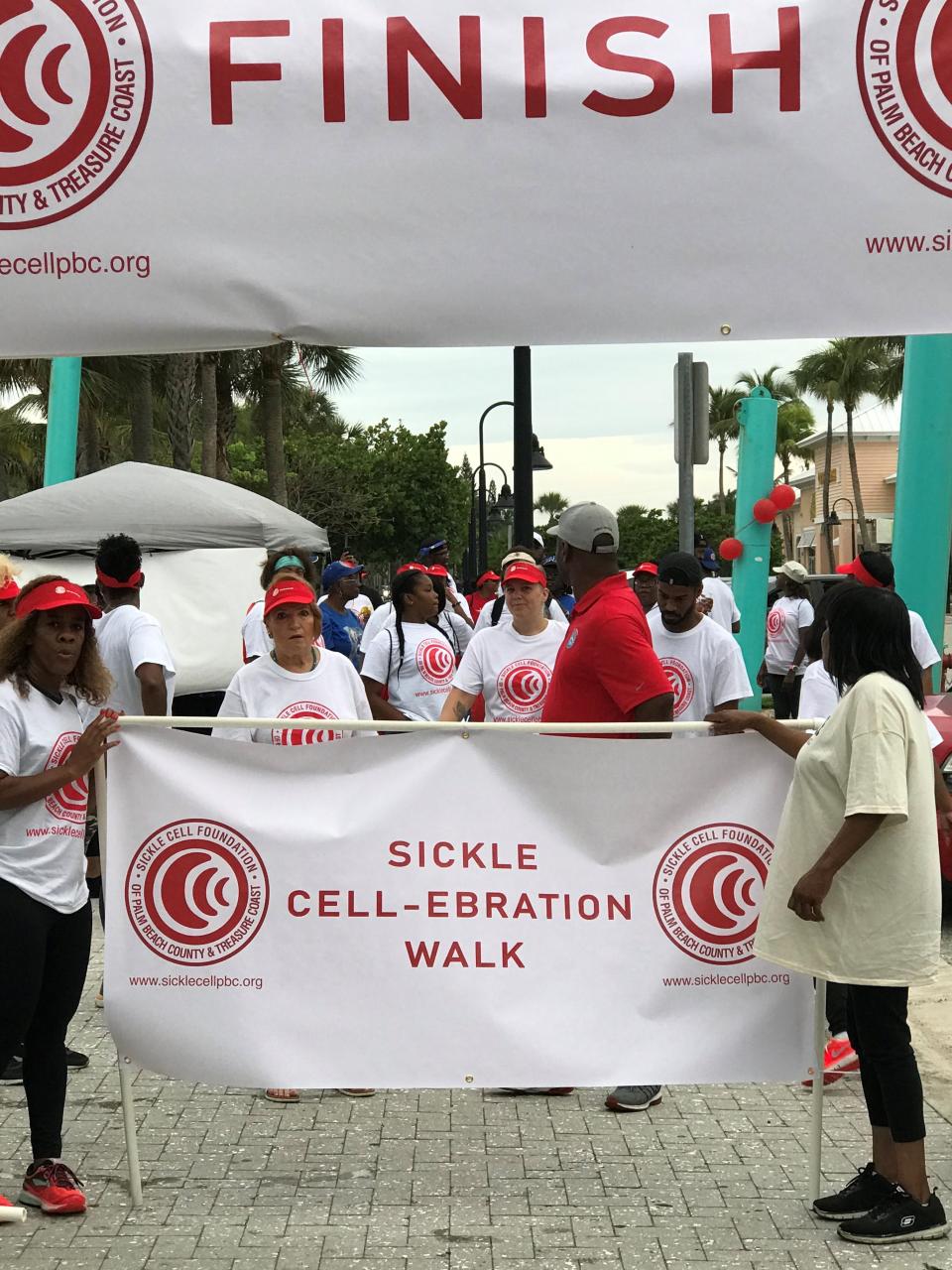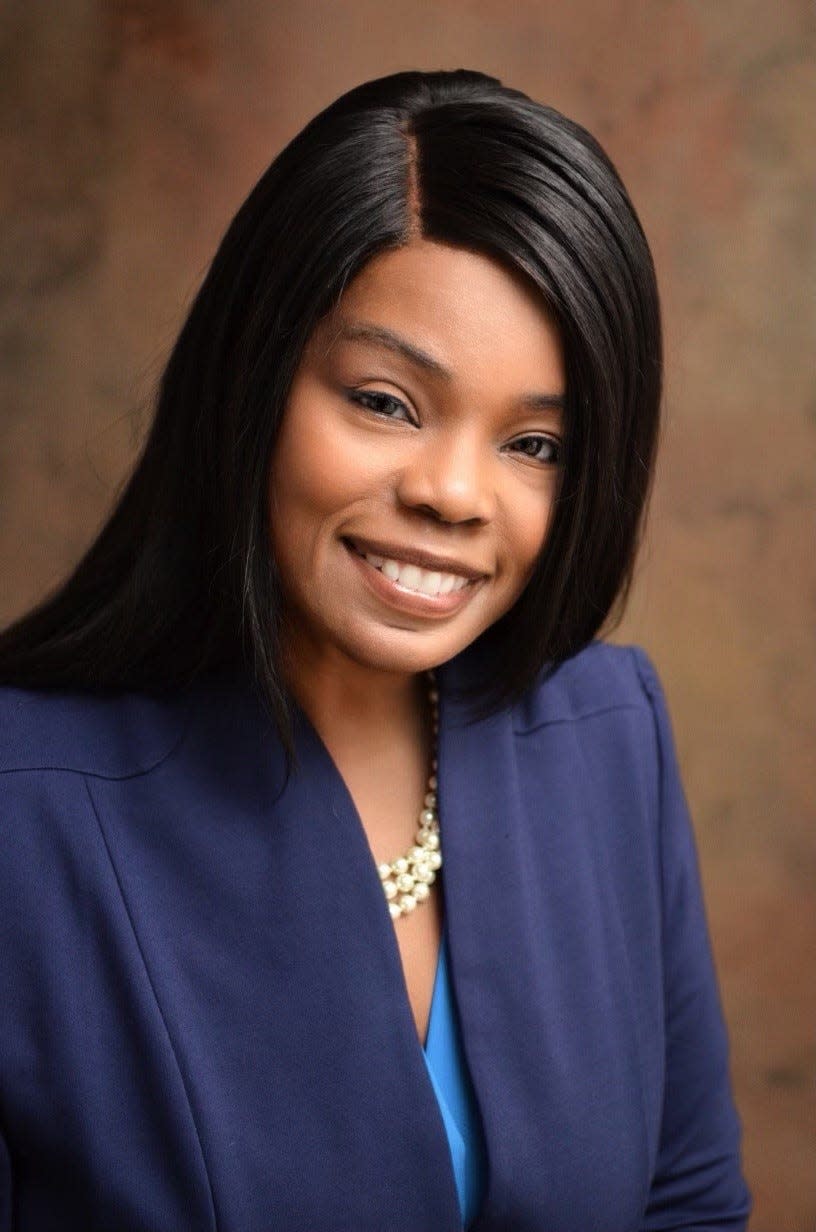Sickle Cell walk in West Palm: Are we any closer to curing the red blood cell disease?
The Sickle Cell Foundation of Palm Beach County and Treasure Coast is holding its annual awareness walk in West Palm Beach Saturday as hopes rise for new a cure to a debilitating illness that strikes one in every 365 Black Americans.
Gene therapy has emerged alongside bone-marrow transplant as a treatment for sickle cell disease, an inherited condition where a person's red blood cells are 'C' or sickle-shaped instead of fully circular, congesting blood flow and causing intense pain.
Sickle cells die earlier than circular blood cells. People with sickle cell have a life expectancy roughly 20 years shorter than others in the general population, according to the American Journal of Managed Care, which in March reported on the results of a nationwide study.

An estimated 100,000 people in the United States have sickle cell disease, which primarily affects Black Americans though Hispanics and people of southern European or Indian descent have also suffered from the condition.
Many Black Americans have come to believe that research and treatment options for sickle cell have been slow to develop because the illness afflicts those without the cultural, political or financial means to bring attention to the condition.
An estimated $161 million in research money was spent on sickle cell in 2023, according to figures compiled by the National Institutes of Health. That's about half as much was spent researching sleep, and it's less than the $225 million spent researching malaria, a disease that was eradicated in the U.S. more than 70 years ago.
Despite the pain it causes and despite the shortened life expectancy of those with sickle cell, the illness has actually been the topic of jokes in movies like "Ted 2" and in HBO's "Scooby-Doo" spinoff, "Velma."
MORE: Honoring rapper Kodak Black sparks tiff between Palm Beach County commission candidates
The notion that the illness has not generated a focus on par with its seriousness was supported by a New York Times opinion piece written in 2019 by Dr. Aaron E. Carroll, a pediatrician and professor of pediatrics as the Indiana University School of Medicine.
Carroll's article was headlined "Sickle Cell Disease Still Tends to be Overlooked."
"There are few treatments for it, and experts say not enough is being done to prevent complications," Carroll wrote.
Shalonda Warren, a West Palm Beach City Commission member and the executive director of the Sickle Cell Foundation of Palm Beach County and the Treasure Coast, said what Carroll wrote in 2019 remains true today.

"This disease is still extremely devastating, and there are far fewer advances made in sickle cell disease than in other health issues," she said. "People are still dying from the complications. The pace of the cure is not keeping up with the pace of the people who are dying from complications of the disease."
Sickle Cell Foundation is trying to change the dialogue on the illness
Saturday's walk, which will be held at Dreher Park, will be the 20th the foundation has held since 2004. The walk will include an awards ceremony with prizes, local vendors and a mini-health screening.
One in 13 Black Americans carry the trait for sickle cell. If both members of a couple have the trait, each of their children will have a one in four chance of having the disease.
Both of Medjeen Anglade's parents had the trait, and, of her five siblings, she was the only one who got the disease.
Anglade's experience highlights both the hope of those battling sickle cell and the ongoing complications and problems the condition still presents.
Now 28, Anglade was born and raised in Florida with stints in Coral Springs and Boynton Beach. She said she doesn't remember how old she was when she was told she had sickle cell.
SUNSET LOUNGE UPDATE: West Palm Beach's CRA, attorney dispute legal fees; site still closed
Her parents, immigrants from Haiti, tried to relay the limitations sickle cell would present.
"My parents put it in my brain that I couldn't do stuff," Anglade said. "But me being me, I don't like illness being a crutch. I try not to let this hinder me. It's there. But I always think you focus on what you can do, not what you can't do."
What are the symptoms of sickle cell disease?
Sickle cell, however, didn't care about Anglade's positive outlook or her determination to live a full full life.
She'd get a tingling sensation in her jaw, the first sign that she was about to have what sickle cell sufferers often call a sickle cell crisis, an episode when a person's misshapened cells restricts blood flow.
The pain would be intense, and it could be triggered by anything.
"Stress, temperature change," Anglade said. "There's no rhyme or reason for why it would come."
Anglade would often feel the pain in her arm and back.
"I felt like somebody was squeezing my arm," she said. "Squeezing my arm to death. It was like I had an invisible backpack and somebody was piling in bricks."
Anglade said she'd try to ride out the pain.
MORE: Historic Black community Pleasant City in West Palm Beach celebrates 'family reunion'
"I'd wait until the pain was like a seven, eight or nine before I went to the hospital," she explained. "I was like, 'OK, I can't take it any more.'"
Hospitalizations were frequent, every three months and, sometimes, every other month.
It was during her care, however, that Anglade found a life's mission in the work her nurses performed trying to ease her suffering.
How can sickle cell disease be cured?
Anglade said she decided she wanted to be a nurse. A health care caseworker told her family about a possible cure through a bone-marrow transplant.
The procedure would be risky and painful for her and a possible donor. Anglade said her father reminded her of her life goals and urged her to give it a try.
"My dad was like, 'I know you want to be a nurse, but this is something you have to do first," Anglade said. "You need your health."
Then-17 year old Anglade also needed a match. That's where having four sisters comes in handy. One younger sister, the fortuitously named Matchli Anglade, was a match.
Matchli was about 14 when she learned she was a match for her big sister. Anglade said her little sister, with whom she had frequently sparred, was scared but determined.
The procedure was considered a success.
"It actually brought us closer," Anglade said. "Now, she's like my best friend."
The transplant did not rid Anglade of all of the sickle cells, and those that remained still cause pain flare ups.
"It's not like it was," Anglade said, "but it can still get pretty bad."
Anglade developed GvHD, a post-transplant condition where the graft's immune cells recognize the host as foreign and attack, causing a range of problems including mouth ulcers, rash and abdominal pain.
For Anglade, the pain radiated from her hip. She eventually had to have a hip replacement.
Making matters worse, her medical team had been disrupted. A trusted doctor in Miami left the practice, and Anglade "didn't have that continuity" with her new care providers.
She became deeply dispirited.
"I just told my mom, 'What's the point of living?'" Anglade said.
An aunt in Boston had an idea: come up and get guidance from that city's community of medical experts.
Anglade followed that advice and eventually moved to Boston.
Last year, she got her bachelor's degree in nursing from the University of Massachusetts-Boston. Now, she's trying to provide the type of care she so often received.
Anglade said she agrees with those who argue that the treatments for sickle cell — bone-marrow transplant and gene therapy — are both expensive, painful and carry too many risks.
"I'd love for people to have more awareness so we could have more funding and more research," she said.
If you go
When: Saturday, Dec. 9.
Where: Dreher Park South, 4701 Dreher Trail S., West Palm Beach.
Registration: 8 a.m.
Walk begins: 9 a.m.
Wayne Washington is a journalist covering West Palm Beach, Riviera Beach and race relations at The Palm Beach Post. You can reach him at wwashington@pbpost.com. Help support our work; subscribe today.
This article originally appeared on Palm Beach Post: Sickle Cell Foundation holds annual awareness walk in West Palm Beach

